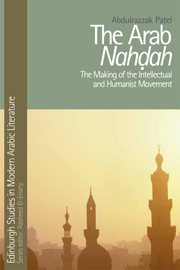Book contents
- Frontmatter
- Contents
- Series Editor's Foreword
- Acknowledgements
- Preface
- Introduction: Perspectives, Paradigms and Parameters
- 1 Contemporary Interpretations of the Nahḍah: Tradition, Modernity and the Arab Intellectual
- 2 The Reintegration of Pre-modern Christians into the Mainstream of Arabic Literature and the Creation of an Inter-religious Cultural Space
- 3 Guardians of the Pre-modern Arab-Islamic Humanist Tradition: Legends without a Legacy, a Tradition without Heirs
- 4 Language Reform and Controversy: The al-Shartūnīs Respond in Defence of the Pre-modern Humanist Tradition
- 5 Arabism, Patriotism and Ottomanism as Means to Reform
- 6 Arab Intellectuals and the West: Borrowing for the Sake of Progress
- 7 Education, Reform and Enlightened Azharīs
- 8 Enacting Reform: Local Agents, Statesmen, Missionaries and the Evolution of a Cultural Infrastructure
- Conclusion
- Bibliography
- Index
3 - Guardians of the Pre-modern Arab-Islamic Humanist Tradition: Legends without a Legacy, a Tradition without Heirs
Published online by Cambridge University Press: 05 October 2013
- Frontmatter
- Contents
- Series Editor's Foreword
- Acknowledgements
- Preface
- Introduction: Perspectives, Paradigms and Parameters
- 1 Contemporary Interpretations of the Nahḍah: Tradition, Modernity and the Arab Intellectual
- 2 The Reintegration of Pre-modern Christians into the Mainstream of Arabic Literature and the Creation of an Inter-religious Cultural Space
- 3 Guardians of the Pre-modern Arab-Islamic Humanist Tradition: Legends without a Legacy, a Tradition without Heirs
- 4 Language Reform and Controversy: The al-Shartūnīs Respond in Defence of the Pre-modern Humanist Tradition
- 5 Arabism, Patriotism and Ottomanism as Means to Reform
- 6 Arab Intellectuals and the West: Borrowing for the Sake of Progress
- 7 Education, Reform and Enlightened Azharīs
- 8 Enacting Reform: Local Agents, Statesmen, Missionaries and the Evolution of a Cultural Infrastructure
- Conclusion
- Bibliography
- Index
Summary
While it was the Christian clerics of the Syrian monasteries who prepared the ground for the nahḍah in Lebanon, it was the Muslim shaykhs of perhaps the greatest institution of Muslim learning, the al-Azhar in Cairo, who led the way in Egypt. An inevitable consequence of the paradigm of decline for the study of Arabic thought and culture in the centuries preceding 1798, however, has been the almost total neglect in modern scholarship of this important institution, its scholars, their vast output and activities. This chapter begins by considering the role of al-Azhar and reveals a picture of an intellectual community that was far from being in the moribund state suggested by proponents of the decline thesis. Al-Azhar not only continued to function as a beacon of Islamic learning during a period widely regarded as one of decline, but also produced a number of outstanding authors who flourished in the fields of philology, poetry and historiography, and had a far-reaching influence on the nahḍah. This chapter then focuses on the humanistic activities of some leading Azharī figures in the eighteenth century such as al-Ṣabbān, al-Zabīdī, al-Jabartī and al-‘Aṭṭār. It is argued that these scholars along with others had laid the cultural foundations for the nahḍah in the nineteenth century, and despite the originally religious orientation of their work and activities they made significant contributions to the nahḍah.
- Type
- Chapter
- Information
- The Arab NahdahThe Making of the Intellectual and Humanist Movement, pp. 75 - 101Publisher: Edinburgh University PressPrint publication year: 2013



